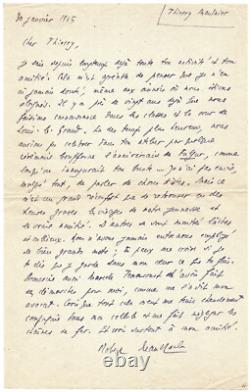
- Homepage
- Author
- Alfred Bruneau (3)
- Beydts (louis) (4)
- Camille Mauclair (3)
- Charles Monselet (3)
- Charles Wagner (3)
- Chateaubriand (5)
- Colette (3)
- Ernest Daudet (3)
- Eugène Labiche (3)
- Jean Couty (3)
- Jean-léon Gérôme (5)
- Louise Read (4)
- Marcel Proust (5)
- Paul Chabas (4)
- Paul Meurice (3)
- Proust (3)
- Roger Martin Du Gard (4)
- Salomon Reinach (3)
- Sully Prudhomme (7)
- Violette Leduc (4)
- Other (3998)
- Binding
- Era
- 18th Century (11)
- 1900 To 1960 (61)
- 1930s (4)
- 1960s (5)
- 1970s (7)
- 19th (5)
- 19th Century (48)
- 20th Century (15)
- Beautiful Era (12)
- Belle Epoque (49)
- First Empire (8)
- Nineteenth (19)
- Nineteenth Century (11)
- Post-war (21)
- Restoration (17)
- Revolution (4)
- Roaring Twenties (28)
- Second Empire (21)
- Second World War (5)
- World War Ii (9)
- Other (3713)
- Language
- Theme
- Type
Robert BRASILLACH / Signed Autograph Letter / One Week Before His Execution



Autograph letter signed “Robert Brasillach” to Thierry Maulnier [Fresnes Prison], January 30, 1945, 1 page. In-8° Central fold inherent to the period's envelope. One of the last letters from Robert Brasillach, a week before he was executed for collaboration during the Occupation. I have known for a long time about all your activities and your friendship. It is comforting to think that I never doubted it, even during the years when we were apart.
It has been nearly twenty years since we met in the classrooms and courtyard of Louis-le-Grand. In those happier times, we could have celebrated in your workshop with some buffoonish ceremony the anniversary of Fulgur, just as we did when your bust was inaugurated. Despite everything, I do not wish to speak of sad things.
But it is a great comfort for me to recall the faces of our youth and true friendship in serious hours. Others have shown themselves to be cowardly and forgetful. We have never used grand words between us; you can believe me when I tell you that I hold in my heart what you do. Also thank Marcelle Tassancourt for having made efforts on my behalf, as my lawyer has told me.
Believe that all this keeps me warmly company in my cell and helps me neglect the iron chains. And above all, believe in my friendship. Classmates at Louis-le-Grand, Brasillach and Maulnier, along with six other friends, made an impact by publishing (mentioned here) in 1927, a police and fantastic serial novel. While the two friends cultivated a certain Maurassian ideology close to the Action française in the early 1930s, Brasillach's ideological trajectory, who became editor-in-chief of the collaborationist weekly in 1937, took a radical turn. Becoming the champion of collaboration, he conveyed his hatred of Jews, the Popular Front, the Republic, and his admiration for the Third Reich, whose triumph in France he constantly hoped for.
The pamphleteer turned himself in as a prisoner in September 1944 after his mother and brother-in-law were arrested to pressure him. Imprisoned in Fresnes, he was charged with intelligence with the enemy. When his trial opened on January 19, 1945, he was sentenced to death on the same day after a twenty-minute deliberation. A significant petition from renowned artists and intellectuals, initiated by François Mauriac, Jean Anouilh, and Marcel Aymé, requested General de Gaulle, head of the provisional government, to grant clemency to the condemned.
The general chose not to commute the sentence, which led to the execution of the sentence: the young writer, 35 years old, was shot at the fort of Montrouge on February 6, 1945, at 9:40 AM. Unpublished letter not included in Letters Written in Prison. (Les sept couleurs, Paris, 1952).
